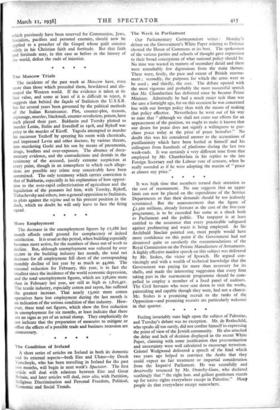The Week in Parliament Our Parliamentary Correspondent writes : Monday's
debate on the Government's White Paper relating to Defence showed the House of Commons at its best. The spokesmen of the various parties and schools of thought gave expression to their broad conceptions of what national policy should be. No time was wasted in matters of secondary detail and there were remarkably few digressions from the main themes. These were, firstly, the pace and extent of British rearma- ment ; secondly, the purposes for which the arms were to be used ; and thirdly, the cost. The debate opened with the most vigorous and probably the most successful speech that Mr. Chamberlain has delivered since he became Prime Minister. Admittedly he had a much easier task than was the case a fortnight ago, for on this occasion he was concerned less with our foreign policy than with the means of making that policy effective. Nevertheless he went out of his way to state that " although we shall not cease our efforts for an appeasement of the position, we ought to make it known that our desire for peace does not signify a willingness to pur- chase peace today at the price of peace hereafter." No doubt this was his considered answer to the accusations of pusillanimity which have been hurled at himself and his colleagues from hundreds of platforms during the last two week-ends. It was certainly a very different tone from that employed by Mr. Chamberlain in his replies to the late Foreign Secretary and the Labour vote of censure, when he really sounded as if he were adopting the maxim of " peace at almost any price."










































 Previous page
Previous page